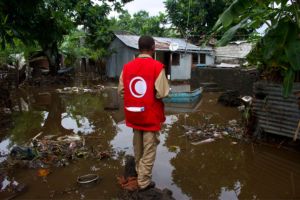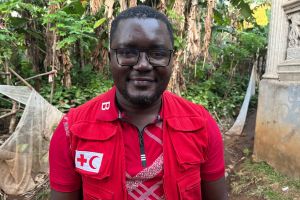Over the last year, many countries in Eastern and Southern Africa have navigated cholera outbreaks due to weather-related issues like heavy rains, floods, and landslides.
Cholera is an infectious disease caused by bacteria. It spreads through contaminated water sources or food.
As a result, the outbreaks impacted access to food and water resources.

The Comoro Islands (Comoros), a small country made up of three islands in the Indian Ocean off the coast of East Africa, was among the countries that faced a cholera outbreak. In Comoros, a significant number of cholera cases affected children and youth.
When the Union of Comoros declared an official cholera outbreak on February 2, 2024, the Red Cross Red Crescent Movement responded to strengthen local capacity. With local teams nationally recognized for their experience, the Comoros Red Crescent played a central role in the epidemic response.
With support from the Government of Canada, the Canadian Red Cross sent five humanitarian experts with a variety of backgrounds to support and work alongside the Comoros Red Crescent’s overall cholera response.

One of these experts, Yves Ngaleu, spent three months in Comoros as a community engagement and accountability (CEA) coordinator. This position ensures the important contributions and values of affected community members are incorporated into the Red Cross Red Crescent Movement’s response and that a locally led approach guides the work.
Yves worked very closely with the Comoros Red Crescent to help train volunteers to share information on how to prevent cholera and collect feedback on programming from affected community members to inform the Comoros Red Crescent’s response.
Born and raised in the southwest region of Cameroon, Yves began his career with the Red Cross Red Crescent Movement in June 2021 with the International Federation of Red Cross and Red Crescent Societies (IFRC). His experience as an IFRC CEA Senior Officer for the Central Africa Region made Yves well suited to join the team of Canadian Red Cross humanitarian CEA experts in October 2023.
“I get immense satisfaction seeing how actively involving communities in program design and decision-making truly transforms our operations,” Yves explained.
In addition to providing humanitarian experts to support the response, the Canadian Red Cross also collaborated with the French Red Cross to set up oral rehydration points and infection, prevention and control measures in treatment centres that helped manage public health needs and prevent the further spread of cholera. Yves’s role helped to engage partners on the ground supporting the Comoros Red Crescent and ensure that the operation is managed with local priorities in mind.“It's a powerful reminder that humanitarian work is most impactful when it's done in partnership with, and led by, the communities we serve.”- Yves Ngaleu
“Imagine a world where community members are at the core of a humanitarian intervention, where people affected by crises are orienting our decisions and participating in decision-making in humanitarian interventions,” Yves continued. “It's not just about delivering aid, it's about empowering communities to shape their own future.”
Comoros has not reported any new cases of cholera since July 29, 2024, a credit to the hard work and commitment of all the humanitarian partners and local support services involved in this response.
Learn more about how the Canadian Red Cross supports international programs and partnerships around the world.

